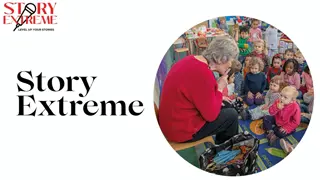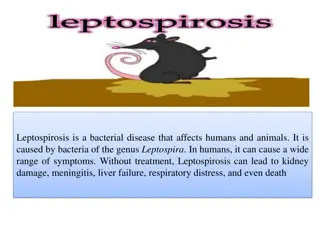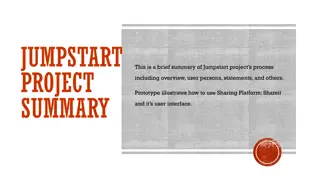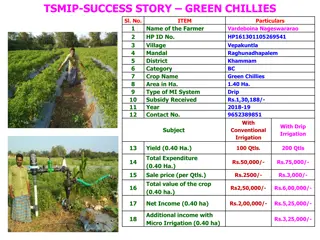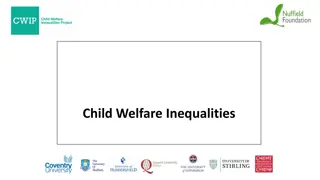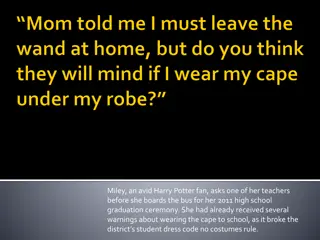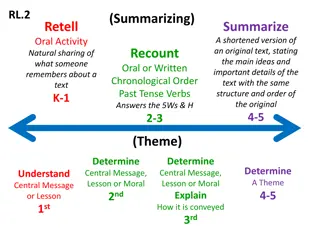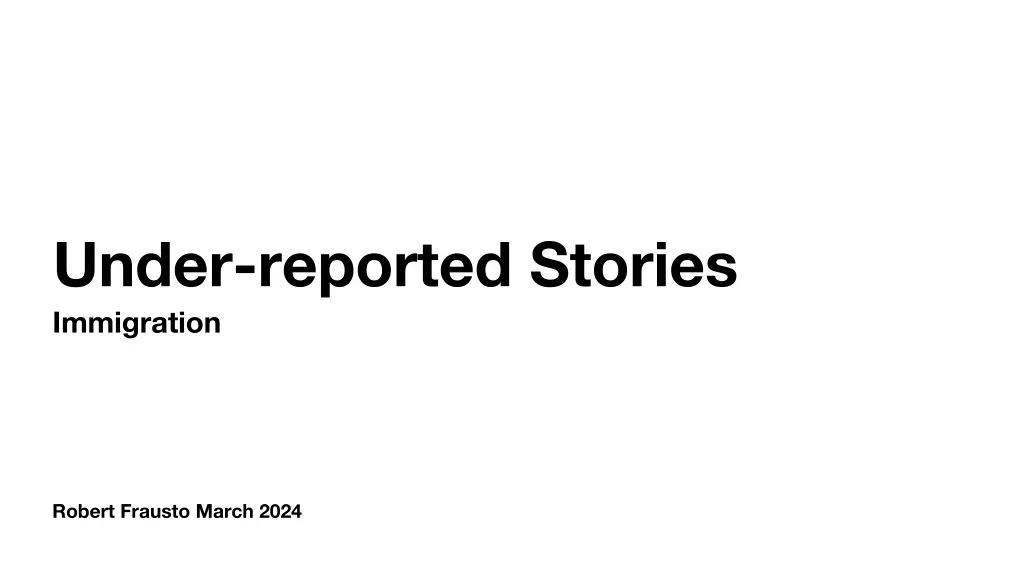
Immigrant Stories: Uncovering Hidden Journeys
Dive into the world of under-reported immigrant stories, exploring the challenges, hopes, and experiences of those seeking refuge and a better life. Discover the profound impact of migration on individuals and communities, shedding light on often overlooked narratives that shape our understanding of human resilience and perseverance amidst adversity.
Uploaded on | 0 Views
Download Presentation

Please find below an Image/Link to download the presentation.
The content on the website is provided AS IS for your information and personal use only. It may not be sold, licensed, or shared on other websites without obtaining consent from the author. If you encounter any issues during the download, it is possible that the publisher has removed the file from their server.
You are allowed to download the files provided on this website for personal or commercial use, subject to the condition that they are used lawfully. All files are the property of their respective owners.
The content on the website is provided AS IS for your information and personal use only. It may not be sold, licensed, or shared on other websites without obtaining consent from the author.
E N D
Presentation Transcript
Under-reported Stories Immigration Robert Frausto March 2024
Presentation Assignment This can be either a group or individual assignment. From the list of Under Reported Stories choose a story that you will present to the class. Presentations will include: Description of the title and topic of the story. Who is the author, what is their story? Summarize the story and focus on a single aspect of the story. On what part of the immigration experience, beginning the journey, the journey itself and the outcome, does the story focus? What is the outcome of the story? What questions would you have for the different people in the story?
Address the loss of and the search for Querencia in your presentation. Also choose from these Essential questions to address in your presentation: Why are people migrating? Why are people willing to leave their homes and move somewhere else? What challenges to people who are migrating face when reaching their destinations? What are the processes people who migrate navigate to stay in the place they move to? What is their experience of these processes and where do you see trends in the challenges/opportunities in these processes? In what ways are people organizing/advocating to address the challenges people face while migrating and trying to remain in their destination? How do the stories of migration explored in this unit compare to experiences of migration in my own community? What is underreported about the experience of migration, and why is it important to tell stories of migration? How do our stories of migration, and the stories explored in this unit, compare to other media representations of migration? How did the story make complex issues relevant and inspire action?
Fleeing Violence, Mexicans Seek Asylum in the U.S. by Rebecca Plevin Omar Ornelas for The Desert Sun Extra-Continental Migration: The Longest Journey to America by Nadja Drost Bruno Federico for PBS Newshour Dreams Derailed by Marcela Rodrigues for The Chronicle of Higher Education Crossing the Border With Children by Madison Powers A Shared Uncertainty: Migration Stories From Tunisia by Audrey Thibert Life After Deportation by Nina Shapiro, Corrine Shin Erika Schultz for The Seattle Times Beyond the Border by Tyrone Beason, Corrine Shin Erika Schultz for The Seattle Times Families Divided by Neena Satija for The Texas Tribune Deported to Haiti Even Though He Wasn t Born There, He s Still Fighting to Get Back to the U.S. by Jacqueline Charles for The Miami Herald They Thought Their Sick Little Girl Would Be Safe in America. Then It Denied Her Family Entry by Tanvi Misra for Politico I ll Do It Again: Hopes of Economic Stability Propel Young Tunisians Across the Mediterranean Sea by Audrey Thibert Seeking Refuge: The Story of Two Women I Know by Ankita Mukhopadhyay for The Wire Uncertain Futures: Ukrainian Refugees in Turkey, One Year In by Diana Rayes Heaven to Hell, Blue Skies to Pain: The Lament of Iraq s Climate Migrants by Susan Schulman for The Daily Maverick Climate Migration: Blind and Homeless Amid Somalia s Drought by Cara Anna for Associated Press An Exodus of Nurses Has Caused a Medical Brain Drain in Nigeria. Are Rich Countries To Blame? by Aurora Almendral and Ibanga Isine for Quartz Said and the Others: The Unresolved Challenges of Migrant Integration in Italy by Giulia Pozzi Coup, COVID, Climate: The Triple Threat Chasing Citizens From Myanmar s Rice Bowl by Kiana Duncan for The Guardian Dreams Detained: Young Migrants and the Families They Leave Behind in Guatemala by Jessica Marcy A Country That Welcomes Migration by Patrick Ammerman for Yes! Inside Malaysia s Living Hell for Refugee Children by Ifath Sayed and Jueun Choi for News Deeply Far From Home by Amie Ferris-Rotman and Zahra Joya for Time For Young Venezuelan Migrants in Brazil, Drugs, Gold and Early Death by Emily Costa, Rodrigo Chagas and Mariana Rios for InfoAmazonia Fleeing Violence, Mexicans Seek Asylum in the U.S. by Rebecca Plevin & Omar Ornelas for The Desert Sun Extra-Continental Migration: The Longest Journey to America by Nadja Drost & Bruno Federico for PBS Newshour Dreams Derailed by Marcela Rodrigues for The Chronicle of Higher Education Crossing the Border With Children by Madison Powers A Shared Uncertainty: Migration Stories From Tunisia by Audrey Thibert Life After Deportation by Nina Shapiro, Corrine Shin & Erika Schultz for The Seattle Times Beyond the Border by Tyrone Beason, Corrine Shin & Erika Schultz for The Seattle Times Families Divided by Neena Satija for The Texas Tribune Deported to Haiti Even Though He Wasn t Born There, He s Still Fighting to Get Back to the U.S. by Jacqueline Charles for The Miami Herald They Thought Their Sick Little Girl Would Be Safe in America. Then It Denied Her Family Entry by Tanvi Misra for Politico I ll Do It Again: Hopes of Economic Stability Propel Young Tunisians Across the Mediterranean Sea by Audrey Thibert Seeking Refuge: The Story of Two Women I Know by Ankita Mukhopadhyay for The Wire Uncertain Futures: Ukrainian Refugees in Turkey, One Year In by Diana Rayes Heaven to Hell, Blue Skies to Pain: The Lament of Iraq s Climate Migrants by Susan Schulman for The Daily Maverick Climate Migration: Blind and Homeless Amid Somalia s Drought by Cara Anna for Associated Press An Exodus of Nurses Has Caused a Medical Brain Drain in Nigeria. Are Rich Countries To Blame? by Aurora Almendral and Ibanga Isine for Quartz Said and the Others: The Unresolved Challenges of Migrant Integration in Italy by Giulia Pozzi Coup, COVID, Climate: The Triple Threat Chasing Citizens From Myanmar s Rice Bowl by Kiana Duncan for The Guardian Dreams Detained: Young Migrants and the Families They Leave Behind in Guatemala by Jessica Marcy A Country That Welcomes Migration by Patrick Ammerman for Yes! Inside Malaysia s Living Hell for Refugee Children by Ifath Sayed and Jueun Choi for News Deeply Far From Home by Amie Ferris-Rotman and Zahra Joya for Time For Young Venezuelan Migrants in Brazil, Drugs, Gold and Early Death by Emily Costa, Rodrigo Chagas and Mariana Rios for InfoAmazonia
Exemplar Exiled Soldiers Deported U.S. Veterans Feel Abandoned by the Country They Defended Author: Mar a In s Zamudio Mar a In s Zamudio covers immigration for WBEZ. She is an award-winning investigative reporter who is now part of the race, class, and communities team. Prior to joining WBEZ, she worked for American Public Media's investigative team. She's also worked as an investigative reporter for The (Memphis) Commercial Appeal and Chicago Reporter magazine. In 2015, Zamudio and a team of reporters from NPR's Latino USA received a Peabody National Award for their coverage of Central American migrants. Zamudio's story was reported from the Mexico-Guatemala border and it focused on the danger women from Central America face while traveling through Mexico as they try to reach the United States. Her work has appeared in the Associated Press, The New York Times, National Public Radio, NBC 5 Chicago, Telemundo, Univision, among others.
For the first time, the government tried to identify how many veterans have been deported. This report shows that 250 veterans facing deportation, 92 were removed from the country. Nine of the deported veterans had service-connected disabilities, including post-traumatic stress disorder. The deportation of noncitizen veterans is an unintended consequence of the Illegal Immigration Reform and Immigrant Responsibility Act (IIRIRA), signed by former President Bill Clinton in 1996. Billed as an anti-crime effort, the law made it possible to deport legal permanent residents convicted of certain felonies. A section of the U.S-Mexico border wall is painted with art and the names of deported U.S. veterans in Tijuana. Image by Erin Siegal. Mexico, 2019
The article highlights the story of 8 veterans deported out of the US. The Story The Issue They came to the U.S. as children with their families and as legal permanent residents. As adults, they enrolled in the military with the promise of expedited citizenship, which never happened. After serving, they got in trouble with the law. It s a common story for veterans returning home from battle. However, unlike citizen veterans who run afoul of the law, legal permanent residents can be deported, if they re convicted of certain felonies. They also have one thing in common: they want to return to the country they served or, at the very least, they want to receive access to medical care from the U.S. government. Many of them have service related disabilities. In the US they were self medicating. They continue to suffer from those conditions added to the stress of surviving in a place where they feel they don t belong. The story is important because these veterans, who are American citizens in every way but legal , are being denied their civil and human rights.
Querencia Quotes from the story show that these veterans have lost their querencia. They ve been deported to countries that feel foreign to them. Regardless of where we re born, we all feel like this is not our home. This is not our country, Our ties are so strong. And our commitment to our country is stronger than where you were born. We don t belong to the country we were deported to. They also have one thing in common: they want to return to the country they served or, at the very least, they want to receive access to medical care from the U.S. government.
Joaquin Jack Aviles, 43 Deported due to weapons conviction. Aviles kept trying to sneak back into the US. He was arrested and served time and was deported 2 more times. Deported due to drug and weapons conviction. He states: Since I hadn t lived [in Mexico], I didn t really speak the language. I attempted to re-enter [the U.S.] again because that s my home. That s my country. Salgado is trying to view his deportation in a positive way. He describes it as a fresh start. I m not trying to go back, he said. I would like access to medical treatment at the VA. He has decided to stop trying to cross the border and to try and find a way to live in Mexico.
Jos Velasco, 74 Hector L pez, 55 He was charged with assault but never convicted. He was convicted of several marijuana charges. He is trying to return to the US. He is trying to return to the US. He sold his business to fight to stay in the US. He has grandchildren he has never met. I will go back. Because that s my country. I m more American than the average American. At least I served, he said. I m Mexican by birth. By heart, I m an American citizen. I m an American down to the core, L pez said. Apple pie, baseball, football, basketball, you name it. I don t like flan, and I don t like soccer.
There are over 400 deported veterans living in different parts of the world. Most are in Mexico. Others are in India, Costa Rica, the Philippines and Kenya. They shared similar stories. They came to the U.S. as children with their families and as legal permanent residents. As adults, they enrolled in the military with the promise of expedited citizenship, which never happened. After serving, they got in trouble with the law. Many are there because the ICE and the US military did not follow proper procedures during the deportation process. They have created a support system in Juarez and Tijuana to help deported veterans.

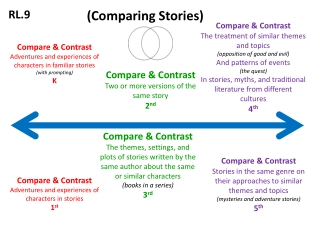
![Read⚡ebook✔[PDF] The Untold Stories of the Space Shuttle Program: Unfulfilled D](/thumb/21685/read-ebook-pdf-the-untold-stories-of-the-space-shuttle-program-unfulfilled-d.jpg)
